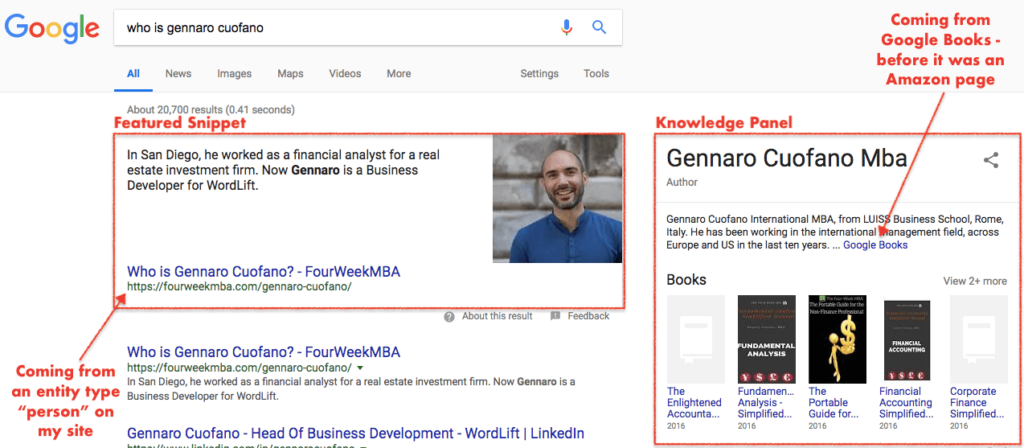As search engines move toward voice search, mobile personal assistants adoption is growing at a fast rate. While the transition is already happening, there is another interesting phenomenon to notice. The SERP has changed substantially in the last couple of years. As Google rolls out new features that appear on the “above the fold” (featured snippets, knowledge panels, and featured snippets filter bubbles), those allow us to understand how voice search might look.
In this article, we’ll focus mainly on the Knowledge Panel, why it is critical, and how you can get it too.
The Knowledge Panel: The Google’s above the fold worth billions
The Knowledge Panel is a feature that Google provides quick and reliable information about brands (be them personal or company brands). For instance, in the case above, you can see that for the query “who’s Gennaro Cuofano” on the US search results, Google is giving both a featured snippet (on the left) and a knowledge panel (on the right).
While the featured snippet aims to provide a practical answer, fast; the knowledge panel aims to provide a reliable answer (coming from a more authoritative source) and additional information about that brand. In many cases, the knowledge panel is also a “commercial feature” that allows brands to monetize their products. For instance, you can see how my knowledge panel points toward books on Amazon that could be purchased in the past.
This space on the SERP, which I like to call “above the fold,” has become the most important asset on the web. While Google’s first page remains an objective for most businesses, it is also true that going toward voice search traffic will be eaten more and more by those features that appear on the search results pages, even before you get to the first position.
How does Google create Knowledge Panels? And how do you get one?
Knowledge Panel examples
Here are some examples of Google Knowledge Panels, which refer to different search categories (sports, books, movies, celebrities).
SPORT BOOK


MOVIE FAMOUS PERSON


Knowledge panel: the key ingredient is Google’s knowledge vault
When people search for a business on Google, they may see information about that business in a box that appears to the right of their search results. The information in that box, called the knowledge panel, can help customers discover and contact your business.
In most cases, you’ll notice two main kinds of Knowledge Panels:
- Brand panels
- Local panels
While brand panels provide generic information about a person or company’s brand, local panels offer local information. You can see how the local panel offers the local business’s address, hours, and phone in the example above. In short, that is a touchpoint provided by Google between the user and the local industry.
Where does Google get the information from the Knowledge Panel? Google itself specifies that “Knowledge panels are powered by information in the Knowledge Graph.”
What is a Knowledge Graph?
In 2012 Google started to build a “massive Semantics Index” of the web called Knowledge Graph. In short, a knowledge graph is a logical way to organize information on the web. In the past, Google could not rely on the direct meaning of words on a web page. With the knowledge graph, instead, the search engine can collect information on the web and organize it around simple logical phrases, called triples (for ex. “I am Gennaro” and “Gennaro knows Jason”).
Those triples are combined according to logical relationships, and those relationships are built on top of a vocabulary called Schema.org. In short, Schema.org defines the possible relationships available among things on the web.
Thus, two people that in Schema are defined as entity type “person” can be associated via a property called “knows.” That is how we might make it clear to Google that the two people know each other.
From those relationships among things (which can be people, organizations, events, or any other item on the web), a Knowledge Graph is born:

Where does Google get the information to comprise in its Knowledge Graph? As pointed out on Go Fish Digital, some of the sources are:
In short, there isn’t a single source from where Google mines the information to include in its Knowledge Panels.
Is a Knowledge Panel worth your time and effort?
Is it worth it to gain a knowledge panel?
A Knowledge Panel isn’t only the avenue toward voice search but also an organic traffic hack. It’s interesting to see how a good chunk of Wikipedia traffic comes from Google’s knowledge panels. Of course, Wikipedia is a trusted and authoritative website. Also, one consequence of knowledge panels might be the so-called no-clicks searches (those who don’t necessarily produce a click-through from the search results pages).
Yet, as of now, a Knowledge Panel is an excellent opportunity to gain qualified traffic from search and get ready for voice search.
How do you get your Knowledge Panel?
- Use additional Schema properties to allow the cross-reference of the data
- Check if you have a Freebase ID
- Use Schema markup and structured data
- Create an item on Wikidata
- Create a Wikipedia page
Key takeaways
As search evolves toward AEO, it also changes how you need to look at content structuring. As Google SERP adds features, such as featured snippets and Knowledge Panels, those capture a good part of the traffic. Thus, as a company, person, or business, you need to understand gaining traction via knowledge panels. The key is Google’s Knowledge Graph, which leverages the Google knowledge vault.
It is your turn now to start experimenting to get your Knowledge Panel!
Big News: Podcast Knowledge Panel now live on Google Search! Find out more here.


